As U.S. immigration policies tighten under the renewed administration of Donald Trump, international musicians are increasingly canceling their planned tours in the United States, citing heightened risks and uncertainty.
Since retaking office, President Trump has promised to carry out the largest mass deportation effort in U.S. history. Although the initiative primarily targets undocumented immigrants, recent incidents involving visa and green card holders being detained have prompted a broader wave of anxiety—now reaching the global music community.
Canadian singer-songwriter Bells Larsen is among those who recently canceled performances. Larsen, whose music explores his personal experience of gender transition, had already secured a valid Canadian passport reflecting his updated gender. However, in March, U.S. Immigration and Customs Enforcement (ICE) announced it would no longer recognize gender markers other than male or female. Concerned that his gender identity might subject him to additional scrutiny or denial of entry, Larsen called off the tour.
“It was absolutely heartbreaking,” Larsen told NPR, referring to his decision. “But I didn’t feel safe continuing with the tour.”
Other artists have taken similar steps. Earlier this month, the Sueños Festival in Chicago—headlined by the chart-topping Mexican group Grupo Firme—was abruptly canceled. Organizers cited difficulties in securing artist visas as a key reason. Visa uncertainty is now a growing barrier for foreign performers entering the U.S., even when proper documentation is in place.
Matthew Covey, an immigration attorney who heads the artist visa nonprofit Tamizdat, says he’s seen an uptick in cancellations.
“More and more artists go through the application process and, in the end, decide it’s not worth the risk,” Covey said.
Though these obstacles are intensifying now, they are not entirely new. For years, foreign musicians have struggled with the U.S. visa system. Processing an artist visa can take several months and often costs as much as $10,000. Even after securing the visa, artists may be turned away by U.S. Customs and Border Protection (CBP) agents, who have broad discretion over who is allowed into the country.
Alistair Elliott, vice president of the American Federation of Musicians of the United States and Canada, noted that during Trump’s first term, immigration officials appeared to apply policies more strictly.
“With shifting policies and guidance under the Trump administration, I think it’s fair to say that some immigration officers may have used the leeway they were given to act more restrictively,” Elliott said.
Some musicians have chosen not to tour in the U.S. for political reasons. Renowned German violinist Christian Tetzlaff recently declined an invitation to perform, citing ethical concerns. Similarly, rock icon Neil Young—originally from Canada and a U.S. citizen since 2020—expressed worries that his criticism of President Trump could jeopardize his ability to return to the country. In response, CBP stated that it does not make entry decisions based on political beliefs.
Yet not all artists are deterred. Polish rock band Trupa Trupa remains committed to its U.S. tour. Band member Grzegorz Kwiatkowski said he sees artistic expression as a vital response to growing political and social repression.
“My activism and Trupa Trupa’s music are not only about political terror and fascism,” Kwiatkowski said. “They are also about beauty. I think beauty and art give people hope.”
As the U.S. live music industry—one of the largest in the world—grapples with increased visa complexity and a chilling political climate, international artists are now faced with hard decisions: whether to risk unstable entry procedures or forego reaching American audiences altogether.
Related Topics:



















